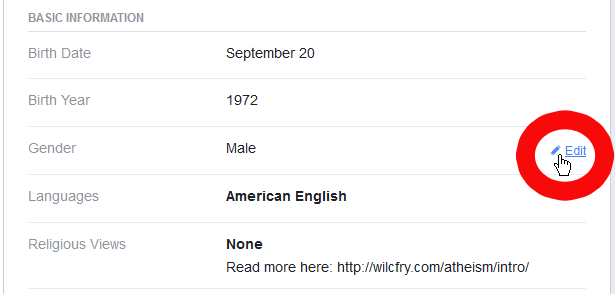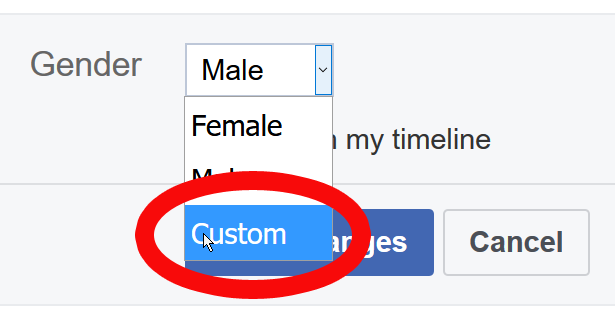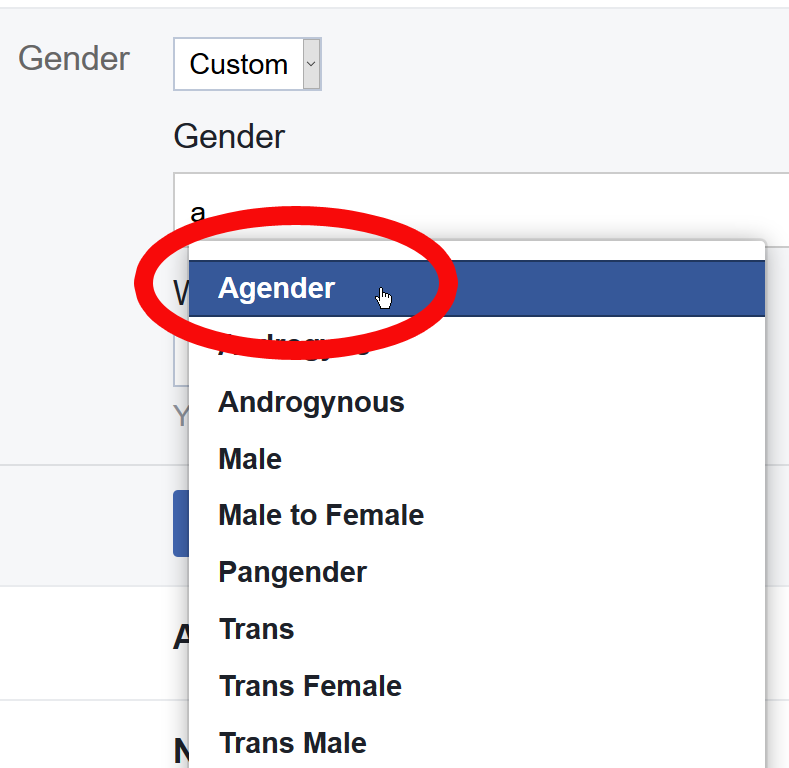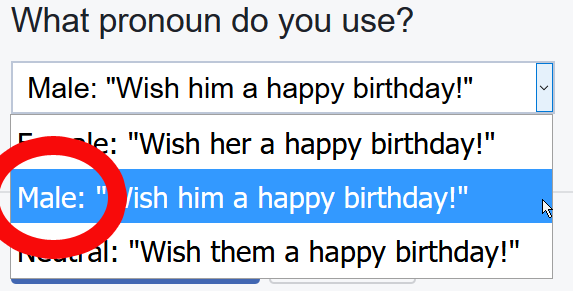FAQ: So... Am I Non-Binary, Or A Lesbian, Or What?
Short Version: Once we separate gender from sex (and they are two separate things), so much becomes clear. Also, I identify as non-binary — more specifically, agender. Read on for the long version:
In discussions over the past few years around LGBTQ+ issues, one stark difference emerges between advocates/allies and opponents: the level of knowledge. As I attempted to understand these issues, I noticed the more I learned about each particular question or argument, the more I sided with progressives.
Here’s an example, seen in many hundreds of discussions about transgender rights: “...Men who wear women’s clothes...”

1989
I no longer have a photo of the finished product, but here I’m getting my hair French-braided by classmates Deneen (left) and Angie (right). I don’t remember who made this photo with my camera. This was on the way home from a high school choir trip in 1989.
You can know, automatically, which side of the issue this person falls. Because only someone against transgender rights would conflate cross-dressing with being transgender. Anyone who’s for protecting persons identifying as transgender would already know that being trans is something else entirely.
About a year ago, I presented my position on transgender rights, including the information that changed my position.
Today, I take a tangent from that discussion, specifically the part where gender and sex are different things and how the systemically enforced culture of binary gender doesn’t make sense. This one is important to me, because I identify as non-binary. Some of you already understand the following. Others might want to. Here you go.
The Terms
The term “non-binary”, also known as genderqueer, “is a catch-all category for gender identities that are not exclusively masculine or feminine”.
I already noted the definition of “gender” on my trans rights page, and how it’s different from biological sex. Briefly, sex describes decides your reproductive system and abilities (physical), while gender is “the range of characteristics pertaining to, and differentiating between, masculinity and femininity”, or “the behavioral, cultural, or psychological traits typically associated with one sex”. In other words, gender doesn’t refer to your genitalia, but to characteristics and traits; it’s not physical but rather about behavior, perceptions, and categorization.
The characteristics/traits associated with masculinity and the ones associated with femininity differ between nations, cultures, and peoples. They have changed over time. The pants/skirt dichotomy didn’t exist before a few hundred years ago, for example. The blue/pink question only came about very recently.

Also 1989
In this photo, I am oozing something other than “manliness”. Again, I don’t remember who made this photo with my camera. Possibly a cousin. It was taken somewhere along the Gulf Coast.
Think of a chart with two columns — one “masculine” and one “feminine”. Fill the columns with all the things our culture identifies as one or the other. The more I thought about that, the more I realized I couldn’t be categorized as one or the other. And, in a lot of places where I DO choose the “masculine” column (for example, I strongly prefer pants to dresses), it’s easy to see how the binary culture pushed me in that direction.
The Problem Of Simplistic Categorization
Humans have a need for categorization; it helps us to survive, and it was built into our brains during the evolution of our species. It’s vital that we can tell the difference between a live tiger and a dead tiger, for example. Or the difference between a leaf and a spider. And we automatically apply this process to our own species, sometimes for good and sometimes for ill.
It makes perfect sense that early humans categorized ourselves into “people that are probably from my tribe and therefore aren’t likely to hurt me” and “people that are from somewhere else and therefore might want to hurt us”. Today, that differentiation doesn’t make as much sense because we don’t live in tribal villages anymore; but it lives on as racism and other forms of bigotry.
It once made sense (for survival) that we automatically categorized humans into male and female groups — biologically. But it never made sense that we did this for gender; yet we did it anyway. A biological human female could match every item in the “masculine” column yet still be able to conceive and bear children, just as a biological human male could fit every item in the “feminine” column and still be able to father children.
The problem arose with the assumption and then the assertion that gender is inextricably tied to sex. This was an unnecessary over-simplification of reality which became amplified by religion and then government.
Binary Gender In Our Culture
“Binary Gender” refers to the current cultural norm of insisting each person must be either masculine or feminine. The strong push toward binary gender identification became starkly evident to me when my children were younger.
I showed my daughter a photo of me when my hair was long. She smiled and said: “Oh, you used to be a woman.” When my wife cut off all her chemically-straightened hair to go natural, our daughter said: “Mommy turned into a man.”
Because before I even realized it, she’d learned one of the primary identifiers of gender in our culture is hair length. She’d learned others too, like makeup, lacy frills, dresses, pink, and cooking. All from watching us.
I had to explain to her that hair length doesn’t indicate gender (or sex). And that none of those other things do either.

Woman’s Hair
This is me, with my hair out, about three months before I finally shaved it all off. In the rural Oklahoma town where I lived and worked, I was repeatedly asked about my “woman’s hair”. Thinking back on this, I’m surprised they allowed me to use public restrooms.
Copyright © 2004 by Wil C. Fry.
(Incidental anecdote: My hair was longest when I lived in a rural Oklahoma town. I lost track of how many people, usually older people, referred to it as “woman’s hair”. “Why do you have woman’s hair?” a police officer asked me when I was introduced. “I thought you were a woman until you turned around”, said a city council member one evening. Even then, long before I began to learn more, I thought their quips were ridiculous. The hair clearly grew out of a male head; how could it be “woman’s hair”?, I wondered.)
I also began to notice how many forms insist on gender being either male or female. I noticed how many school dress codes around the country differentiate between boys and girls. I noticed how retail stores divide things (toys, clothes, bikes, etc.) Why does my son need four pockets on one pair of shorts, but my daughter can’t get pockets on any of her pants?
Choose A Column
Traits traditionally viewed as masculine in Western society include strength, courage, independence, violence, and assertiveness. Also: sex drive, breadwinning, being in charge of the household, thinking instead of feeling, doing instead of thinking, building and fixing things, participating in sports (or at the least being very interested in sports), and others. Hair cut short. No makeup or skirts. Hairy legs and armpits. (But we shave our faces, depending on the decade). Drivers, not passengers. Cowboy hats or ballcaps (removed indoors). Love and protect children, but rarely participate in their care. Interested in running things — managers, bosses, owners. City council and state legislators. Beer or liquor — leave the wine coolers for the nancy boys. We get outside and do outside stuff — hunting, fishing, hiking, and generally getting filthy. If we smell bad, it’s because we were busy doing men stuff. And we’re supposed to have deep voices. We like blue, and don’t wear dresses (unless you’ve got the balls to wear a kilt).
The more a person fits all of these, the more “manly” they are. If a female fits even a few of them, she’s called a “tomboy”.
Remember, I said “traditionally”. And remember, I noted above that these traits have always changed over time and have always differed between cultures. “Being a man” in Texas in 1980 was certainly different than “being a man” in Los Angeles in 2018. And even in one place and at one time, men will disagree over what “manliness” really means. “You wanna be a man, you need to drive a truck”, someone said to me in Oklahoma, in the 21st Century. He referred to my Chevy Corsica as a “college girl’s car”. I didn’t get into the fact that he probably wished women didn’t go to college, but I did mention I’d bought it from a woman who’d used it while in college. I told him I had no need for a truck, nothing to haul in it. He shrugged, as if to say, “Well, if you don’t wanna be a man...”

Wilma?
An app made this image for me earlier this year, saying it’s what I would look like as a woman. I have no interest in looking like that, or in being a woman. I simply think the division between genders is artificial.
Traits traditionally cited as feminine include gentleness, empathy, and sensitivity. Also: passivity during sex, homemaking, caring for children, feeling instead of thinking, appreciating things men have built or fixed, not liking sports nearly as much as men. Long hair. Makeup and skirts. Shaved legs and armpits (but hopefully not faces). Passengers, not drivers. Hats are decorative. Raise the children that men provide for. Cook and clean and let men make the fancy decisions. Teachers but not principals; they nurse but aren’t doctors. They’re secretaries and assistants to powerful men. If they drink, it’s lighter fare. Their outside stuff is limited to flower gardens and gossiping over the fence; indoors protects them from sun and dirt. They smell nice. Their voices are light and musical. They like pink and occasionally wear dresses.
There are a hundred other things we could list, things we grew up thinking (or being told) were either a “man thing” or a “woman thing”. “A lady doesn’t sit like that.” “Don't cry — be a man.”
The artificial either/or rule in our society has dictated for years that you must choose one column or the other. Please don’t misunderstand; I am aware that exceptions have always been allowed. But if you develop too many exceptions, someone might expect you to prove your gender. For example when I was growing up, if a woman intensely played sports, cut her hair short, and drove a monster truck, people automatically assumed she was a lesbian, and they didn’t mean it in a good way. She would have to show up as a bridesmaid looking very feminine, or have a house full of dried flower petals in order for others to accept she was being “true” to her gender. The same was true for men who failed to meet some of the requirements — you’d need to join the Marines or punch a random stranger in the face in order to prove your manliness. Maybe both.
Looking At Myself
A year or two ago, I started going down these lists.
I’ve never been strong like our culture wants men to be. “Courage” was never a word anyone used when asked to “describe Chan in 10 character traits”. I’ve never been violent and I’m rarely assertive outside of discussions with close friends. My wife is the breadwinner. We’re equally in charge of the household. I think AND feel, about equally. I build and fix things when I have to, not because I particularly like it. And I only made sure I was a little good at it because it’s cheaper than hiring someone else to do it. I played sports when I was young (and was decent at a few things), but relied on finesse and strategy rather than speed, strength, or skill. And today, I have no interest whatsoever in watching any sport in person or on television. My hair is short, but for lazy/practical reasons; the same reasons an old woman might keep her hair short. I don’t wear makeup, but I have. (It seems incredibly impractical to me; I don’t think I’d wear makeup regularly if I were a woman either.) As for face-shaving; I keep mine cut to a stubble because I’m biologically incapable of growing a beard (this photo shows the most facial hair I was ever able to grow). If I thought there was any advantage to shaving my legs or armpits, I’d probably do that too. I wear a hat outside sometimes. I’m the primary caregiver for our children. I grocery shop and do household chores like laundry and vacuuming and washing dishes. I’d rather be an assistant than a boss, a team member than a coach, and a facilitator than a dictator. When it comes to alcohol I prefer a chilled pink moscato, fruity mixed drinks, or nothing at all. I love being outdoors in certain weather, but I’ll be in to take a shower as soon as possible. I’ve rarely had “manly” body odor and I don’t care for it. My voice is higher than you’d expect for a man — higher than my wife’s, on average. My favorite color has long been purple or lavender.
I think of so many men I grew up around, and what they liked, and what they said “a man” should be or do. I think of the men I worked with, and worked for, and supervised. And hundreds of men I interviewed or otherwise dealt with when I was a reporter. The very common threads that ran through them have never run through me.
They hunted for fun, for the challenge. I think hunting is cruel — unless your survival is at stake. They went to war. I think war is the second-worst thing humans ever invented, and should be avoided in most circumstances. The military culture I was brought up to respect and admire now seems absurd to me. They concerned themselves with brutal physical realities and I concerned myself with epistemological and metaphysical mysteries. Their moral codes were simple and misogynistic, taught to them by grandfathers and fathers. Mine is nuanced, humanistic, and self-generated. They whittled; I wrote poetry. They broke horses to show their dominance over the animal world. I look into animals’ eyes and wonder what they're thinking and feeling.
I suspect this is a big part of why I rarely liked interacting with people, and why I tended to have more female friends than male.
For fun, I took a few “what gender am I?” quizzes. (There are some pretty stupid ones out there, so be warned.) This was a typical response for me:
“Your Result: Gender neutral
“You follow the neither the male or female stereotype very closely. The majority of male and female identified people are likely to have some similarities to you but not many. This could mean you could share some characteristics of both, or be completely neutral. Your gender is whatever you label it as however, and despite this quiz’s results, you can identify however feels comfortable for you.“
Not that I needed an internet quiz to tell me this. I figured it out a year or so ago, but wasn’t sure what to say about it or whether anything needed to be said.
Related: I have a cousin (technically a first cousin once removed) who came out as j “agender and gender fluid” a few years ago. They prefer the pronoun “they” — which I know will be difficult for me (because “they” was plural when I learned English), but I will try to remember. Seeing their occasional posts on this topic encouraged me to finally say something about myself.

Editing Gender On Facebook
These screenshots show some of the options to edit gender on Facebook. Above is the “details about me” section of my profile, with my cursor hovering over the “edit” button next to gender. Below shows me choosing a “custom” gender, and then selecting “agender” and agreeing to the “him” pronoun.



My Preferences
Pronoun: I am okay with “he”, “him”, and “his”. It won’t offend me. “Chan” (or “Wil” or “Mr. Fry”) will work too, depending on context. I think I’m simply too accustomed to it to be bothered by it.
I wish there were standard, accepted non-gendered singular pronouns, but there aren’t. If English ever comes up with better words, I might choose them. (I won’t use “they” because I’ve too long lived with the belief that it’s plural, dammit — and yes, I’m aware it’s not always used in the plural sense.) If I’m filling out a form and the “gender” section only includes two options, I’m going to check “male” like I have all my life (I don’t have to like it). But if it includes an “other” option, then I’m going to use that box from now on. And I’ve heard about the other pronouns: “ze/hir”, but (1) I don’t like the sound of them, and (2) they don’t sound like they’re spelled — “ze” is pronounced “zee” and “hir” is pronounced “hear”. I don’t like words in which spelling/pronunciation don’t match. Also, no one I know has ever heard of them, and they’re not going to be on any forms I fill out.
Gender: I am okay with “man”/“male”. I’m more than halfway through this life and I figure it’s pointless to insist on some other word at this point. Though “human” works too. But more accurate would be “non-binary”, because I don’t accept that it’s an either-or situation. Even more accurate would be “agender” — because I don’t identify with either gender.
I know I look (mostly) like what people think “men” look like. That’s okay. My name is pretty damn short, so you could just use that, right?
Despite my complaints about Facebook, one good thing on the site is the abundance of gender options (see related screenshots). Besides “male” and “female”, there is “custom”, and from there you can select from a long list. I chose “agender”. It was the same process on Pinterest, Google, and Twitter. Other sites aren’t so accommodating. Yahoo!, for example, doesn’t allow editing gender AT ALL, so I have no idea what choices would be available. Some sites don’t even have a gender question in the profile, like Tumblr, Ello, and others.
Sex: I am genetically and biologically male — unequivocally. I have no desire or intention to mess with that.
Attraction: I’ve always been attracted to women — adult human females. This isn’t going to change any time soon.
(On the other hand, it’s never bothered me to see attractive men, or to be complimented by men.)
Gendered Terms
The English language is littered with words that specify gender, even if we don’t use masculine/feminine articles like many European languages do (el/la in Spanish, le/la in French, etc.) I realized this forcefully when I began working at a newspaper. My boss was a fierce liberal woman who didn’t accept terms like “city councilman”, “chairman”, or “fireman” in our stories. I loved this viewpoint, but was surprised at how many feathers it ruffled.
It was easy to switch most items: “City councilor” actually saved space. “Firefighter” uses alliteration and rolls of the tongue. But all that was about feminism on my boss’s part, not about countering the binary gender culture.
For me, I can very easily switch “husband” to “spouse”, and “father” to “parent”. I’m a stay-at-home parent and loving spouse. See? Gender-free.
Conclusion
I don’t expect any of this to change anyone’s mind. If you’re on board, then you are. Some who read this will not be okay with it; I don’t envy the bile that will rise in their throats. Perhaps there will be someone who is on the fence and simply needed some information to make up his/her mind.
And no, none of this means I have a “mental illness” (a common accusation by regressives when someone refuses to conform to the binary genders). Please consult with a local mental health provider — or one of many helpful websites — if you’re unsure what constitutes mental illness.
I present this piece as a resource I might want to link to in the future when someone admits they don’t understand what “agender” or “non-binary” means. There are plenty of others on the internet. One that was surprisingly informative and easy to read was this one in Teen Vogue.
Comments From Original URL
Dana, 2018.08.15, 14:36
You should come work for my very progressive (very left) organization - we have received hours of diversity and SOGIE (Sexual Orientation, Gender Identity and Expression) sensitivity training. Nobody would bat an eye here if you identify as non-binary (although, they'd likely try to convince you to stop using he/him/his.) There are a number of transgender and non-gender conforming attorneys working here.
I'm a relatively private person and don't volunteer as much about myself (google me and you'll have to do a really deep dive before you hit anything). I've never considered it important that others know my gender identity (or sexual orientation) but that is likely because my gender and biological sex match. I've been called he/him when my hair has been very short but I didn't take offense (my personal creed is as long as I can tell that you're talking to me, I'll answer even if you mispronounce my name or use incorrect pronouns).
Of course, at the end of the day, a non-binary biological female and a binary biological female, will still earn less than a biological male (even if he considers himself non-binary), unless perhaps he also cross-dresses. (For sake of this thought exercise, I will assume that a trans-male will earn more than a cis-female, and a trans-female will earn less than a cis-male – if they otherwise conform to binary catagories.
Who says you can't teach an old dog new tricks. ;-)
Chan Fry, in reply to Dana, 2018.08.15, 14:54
"we have received hours of diversity and SOGIE sensitivity training"
Hopefully, more workplaces will do so in the future. I have serious doubts that very many places around here offer employees such training (though I know the military does at least *some* of it).
"...they’d likely try to convince you to stop using he/him/his..."
Fortunately, I only use "I/me/mine" (rarely speak of myself in the third person, LOL), and I won't complain if others want to switch up their pronouns when referring to me. When I expressed a preference for "he/him/his", it is mainly what I'm most comfortable hearing, but I'll try not to be crotchety about it either way. :-)
"...my personal creed is as long as I can tell that you’re talking to me, I’ll answer even if you mispronounce my name or use incorrect pronouns..."
Basically I'm the same. (And yes, it's possible to mispronounce my name. In many parts of Oklahoma, “Wil” is pronounced "wee-ill" or "wheel". It gave my wife fits to hear it.) But I typically won't respond to "hey!" or "bruh/bro". [[EDIT: When I went by “Chan” as a child, and later as an adult, that also is apparently very easy to mispronounce.]]
"...assume that a trans male will earn more than a biological female...
I assume so too (source). And trans female will suffer the normal anti-female bias, PLUS the anti-trans bias.
Yes, if I were to return to work (not that I ever earned that much to begin with), I assume I would still have the normal male advantages (because I LOOK like a "man"). For example, if I worked at The Home Depot, customers would trust my advice about a tool I've never used -- over the advice of a woman who's an expert at it.
Notes: Updated 2023.04.06 when converted to my new blog system.